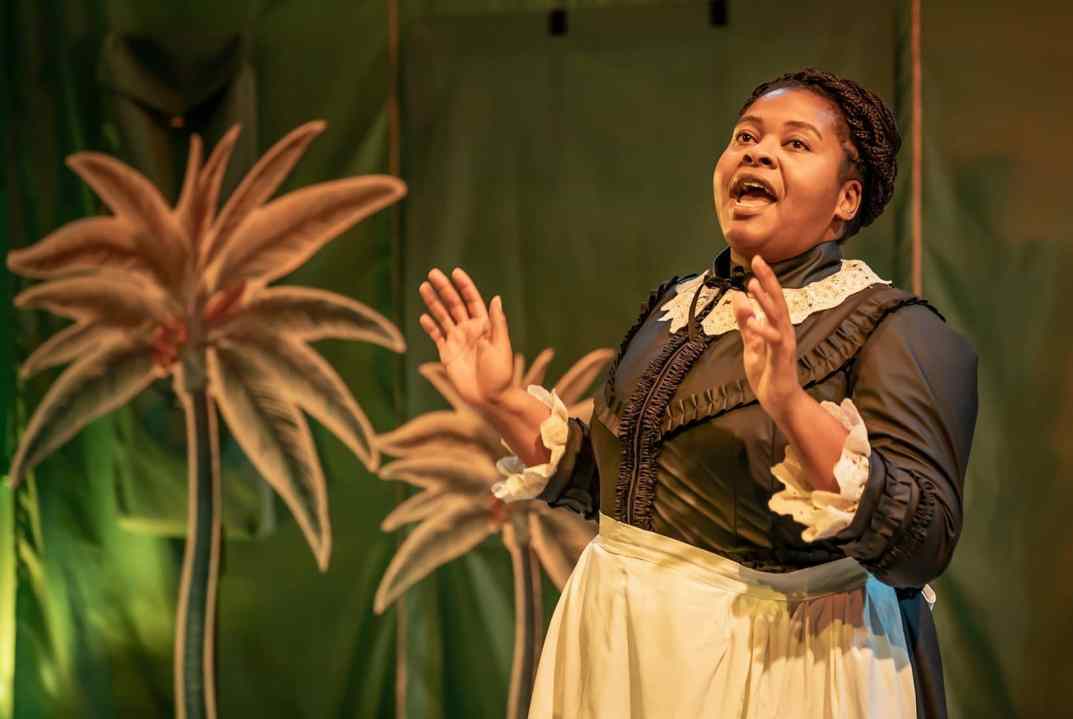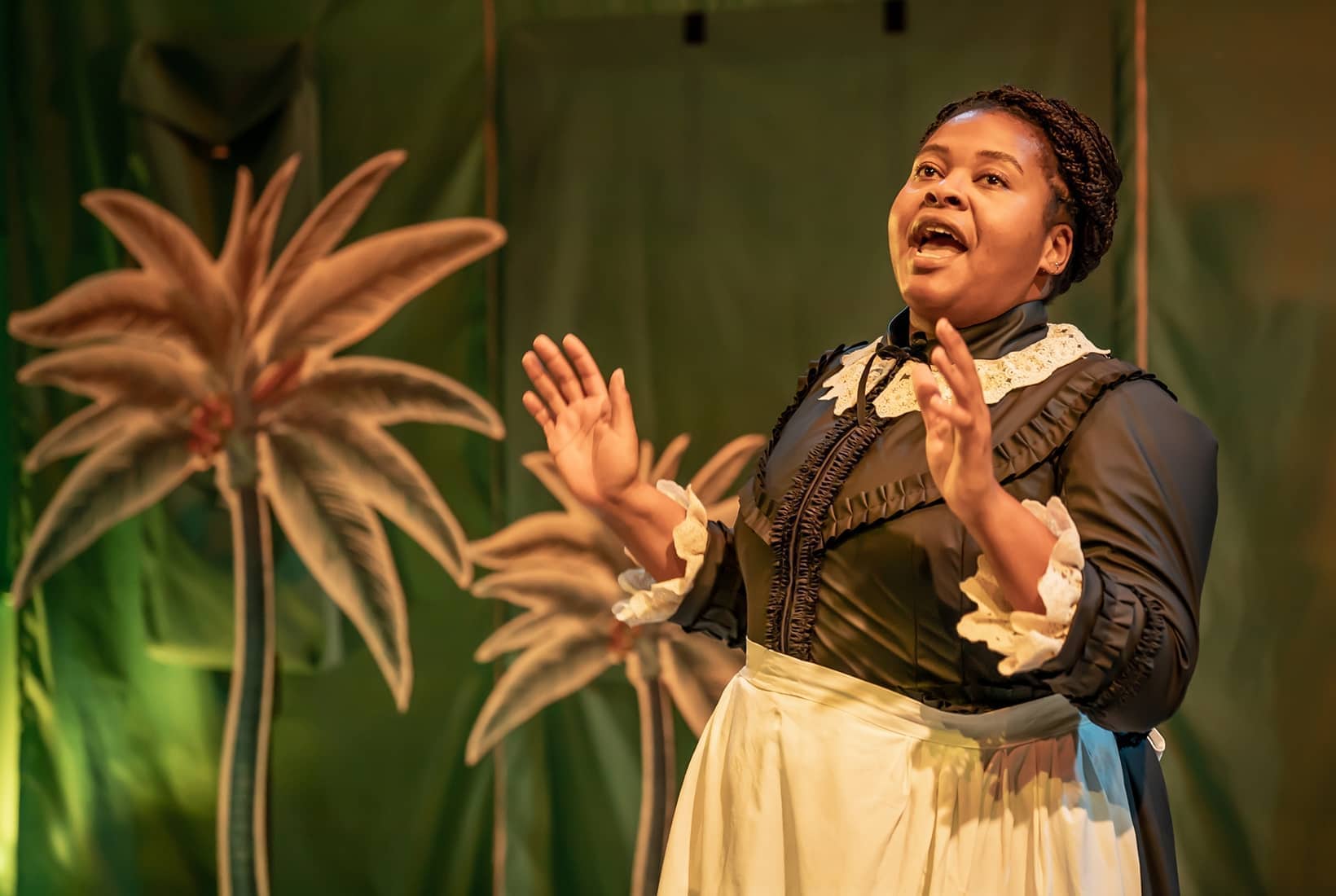The title of the Donmar’s new effort, Marys Seacole, appears to be a misprint and that makes the reader look twice. Good marketing. The show is a blend of Spike Milligan-esque sketches and indignant speeches about race but it starts as a straightforward historical narrative. Mary Seacole enters in Victorian garb and introduces herself as a woman of half-Scots and half-Caribbean heritage who believes that ethnic differences create hierarchies of competence. Her veins, she says, flow with ‘Scotch blood’ and this gives her an entrepreneurial advantage over her ‘indolent’ Caribbean neighbours. Inflammatory stuff. If a white author embraced that supremacist creed, there’d be outrage.
After the history lesson, the scene switches to a modern London hospital where an old dear lies in intensive care surrounded by family members. Her mischievous granddaughter decides to enact a mercy killing, for fun. She switches off Granny’s artificial respirator. Whereupon the old dear springs back to life. That’s hilarious, and it stands as a perfect metaphor for the NHS: if we unplug it, it may stop killing us.
This confused historical cabaret is almost as boring as Newsnight
Next we’re in Central Park where a stressed-out mom cares for an errant toddler while trying to make a vital business call to an important client. This small scene is brilliantly observed and Olivia Williams gets huge laughs playing the fretful mom. She’s the nearest thing the English stage has to Katharine Hepburn and she deserves better material than this confused historical cabaret. The script suffers another attack of wanderlust and relocates to Jamaica in the 19th century where Mary Seacole has opened an upmarket hotel. Waitresses serve mugs of rum to a posh English guest (Olivia Williams again), who pretends to dislike alcohol while discreetly asking for multiple top-ups and getting hammered. A funny skit, superbly done. What else is on offer? Arid chunks of dialogue between two black childminders in New York, and a lengthy hospital scene where Jamaican nurses prattle about husbands, marriage and kids. It’s almost as boring as Newsnight.
The dramatist, Jackie Sibblies Drury, has an oddly unbalanced gift. She writes very amusing white female characters but when she tackles black women she makes them prickly, ill-tempered and humourless. Men don’t interest her at all, it seems. If she expanded her range and learned how to create a plot she could write quite a good sitcom.
The last section takes place in Crimea. Historians have argued that Mary Seacole made the trip as a speculator rather than as an angel of mercy but Sibblies Drury considers her a humanitarian martyr. Seacole meets the haughty and bigoted Florence Nightingale and their encounter is followed by a descent into chaotic battle scenes. The visual aesthetic is deeply ugly and the script loses all sense of direction. The actors are forced to wade through strewn piles of mannequins and body parts. At the close, Seacole’s mother appears and delivers a speech about black oppression at the hands of the white master race. Yet Mary herself had argued that white power results from natural differences in skill levels between the races. Could she not have debated the roots of racial oppression with her mum? No, alas, Sibblies Drury hasn’t the intellectual breadth to lay on a heavyweight clash of ideas. All she can manage is a disconnected heap of angry diatribes and amusing pranks. The box office is struggling. Seats in the dress circle are available for ten quid.
Pretty Woman: The Musical is based on the 1990 movie starring Julia Roberts. It offers a highly sanitised vision of Hollywood’s red-light district. There are no pimps or drugs in this happy-go-lucky playground. Violence, disease and unwanted pregnancies are unheard of. All the hookers are slim, articulate, friendly young beauties who lounge around, like supermodels on a yacht, waiting to be showered with money by nice-looking men. Be warned. If you take your daughter to this show she’ll be on the game the next day.
We meet Vivian, a golden-hearted hustler, who starts a relationship with Ed, an emotionally damaged asset-stripper. Together they learn to grow and change. Viv teaches Ed how to feel like a real human being. And Ed teaches Viv how to spend like a dictator’s wife. Their affair is touching and realistic but there isn’t enough narrative material for a song-and-dance show. In an early scene, Viv swaps her trashy clothes for a luxury frock that dazzles everyone at the Beverly Wilshire hotel. Next day, she goes on another shopping raid and buys another luxury frock that dazzles the hotel guests all over again. Threadbare stuff.
There are songs aplenty, perhaps too many, but they exist outside the narrative. A better constructed show would feature numbers that drive the plot forward and tell a story. What’s left is a sickly-sweet romcom with music tacked on. It’s OK but the general standard of West End musicals is far higher.








Comments